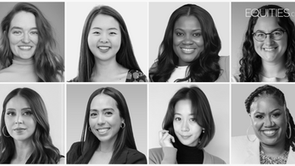Meredith Noble Is Modernizing How Grant Writing Is Taught. Here’s How
- Editorial

- Oct 14, 2022
- 8 min read

Meredith Noble, Co-Founder and CEO of Learn Grant Writing, is helping those ready for a career change become paid grant writers so they have the flexibility to build a life they love.
After quitting her corporate job, Meredith started her self-employment journey but quickly realized she didn’t have a business model to keep her initial idea afloat. She had previously worked as a grant writing consultant for a global firm, so she decided to start hosting workshops to teach others how to hone that skill. Eventually Meredith grew frustrated with live workshops, as she noticed that people can only soak up so much information at once. Thus, Meredith moved into the world of online courses and started Learn Grant Writing, which ultimately makes grant writing more accessible.
We asked Meredith about the problem Learn Grant Writing aims to solve, the story behind how she got into entrepreneurship, and how she employs a growth-mindset attitude.
Q: Tell us the story behind your company’s founding. How and why did you start working on Learn Grant Writing?
A: I quit my corporate job to launch a sexy startup. The period that commenced thereafter is what I call earning my three-month MBA. My sexy startup idea failed before it really got started, and I started grant writing consulting out of desperation. I also started teaching grant writing workshops and enjoyed it. I knew I was providing great information but participants can only soak in so much at one time. Participants weren’t getting the complete transformation I was hoping to provide.
I realized there were no options for learning to write grants in a modern, refreshing way. Existing options were old school and expensive. The idea? Create an online learning experience that makes grant writing approachable and fun. Learn Grant Writing was founded on the belief that our time should be spent adding real value to our communities and leading fulfilling lives.
Q: What problem does Learn Grant Writing solve?
A: We solve the problem experienced by hundreds of burnt-out professionals wanting to make a difference in their community while also getting paid well for it. A day doesn’t go by without someone telling us that we have changed their life.
Q: In what ways has your upbringing or past experiences contributed to how you operate as an entrepreneur?
A: I grew up fifth generation on a cattle ranch in Wyoming. I was working in the hayfields when I was 14 years old and running an old 1956 tractor to put hay into windrows. My job required staying ahead of the stacking crew. They kept catching me, and I was growing frustrated. You can only bounce around so fast in a hayfield!
My father flagged me down. He explained that there was a pattern in the hay if I looked for it. His advice was to “make each move count.” Once I started looking for the patterns, I could see them. I became more efficient and the gap between me and the stacking crew grew. I apply this concept to everything in my business and life. When you look for patterns and make deliberate choices about where you go, you pull ahead.
Q: Have you ever felt like you’re “different”? If yes, in what ways has this contributed to your journey as an entrepreneur?
A: Yes and no. Yes, in the sense that I feel more comfortable with delayed gratification than I feel most others do. That’s a requirement for entrepreneurship. It has been a long haul to get to the financial upside I always knew possible. No is also a true statement. We are all working hard to experience purpose and connection. Entrepreneurship is one way of expressing that desire to do great work.
Q: Did you always know that you wanted to be an entrepreneur?
A: I knew I would be an entrepreneur after local business owners shared how they built their wealth in my high school humanities class. Thankfully, I have moved past thinking I wanted to be a storage unit landlord, but those guest speakers unlocked a curiosity in me to start experimenting. The next year, I started a car detailing business, where I sold Swedish snus out of my locker, “Drunkin’ Donuts” to the late-night bar scene, and Scentsy candles. I even tried selling s’mores packages at a country dance bar next to the outside fire.
Entrepreneurship took a backseat thereafter as I pursued a corporate career. I thrived in those environments as well as in being an intrapreneur. When I left, I was somewhat resentful. I was 27 and still felt like I had a lot to learn from the corporate world. I was so frustrated with my inability to advance my career, however, that I felt I had no choice but to get into entrepreneurship. It was the only way past a glass ceiling.
Q: What were the most difficult and most impactful lessons you’ve learned starting and running a company?
A: Despite having published a No. 1 bestseller on grants and having launched a successful online course, we continued to lose money month over month once we stopped consulting. In December of 2020, we lost $20,000. As an iddy biddy business, that meant we had only six weeks of runway left.
We were able to completely turn around the business by undertaking a complete overhaul in three weeks. In the dark winter days of December in Alaska, my co-founder and I toiled late into the night. We conducted intensive customer discovery interviews to bravely narrow our niche. We tripled our prices and eight months later doubled again. We simplified our offer so it wouldn’t burn us out and would still deliver total transformation.
In doing so, we transformed our company from an epic failure to a seven-figure business. Keep your business model as simple as possible while obsessing over your customer’s success. This allowed us to better understand the customer we loved serving.

Q: What are the biggest mistakes you’ve made?
A: Where do we start! I was stubborn about producing a lead magnet at first because I thought it was offensive to give away so much content for free. Obviously, I now understand the importance of exceptional lead magnet content. I built three courses instead of one. I thought I knew my customer, because I knew my consulting client well. The online course customer is completely different. My business didn’t take off until I finally had more than 20 customer interviews to truly dial in on her needs and aspirations.
I didn’t spend nearly enough time on email list growth at the beginning. I felt like we needed to have our business fully optimized first, and that wasted a lot of time and lost revenue. You name the mistake, and I have probably made it. I’m finally getting a little wiser and seeking mentors who can provide course correction guidance. I’d say the most fresh mistake I have made is not understanding the art of hiring the best talent you can dream of. I have hired based on potential, liking the person, not having many applicants, and by ignoring red flags.
I have always been able to trust my intuition. But I am now learning that experience hones intuition. I have made a million more mistakes, but within those mistakes lies the secret to our growth and improvement. The only way to build an online business is to fail fast and optimize thousands of times. There is no “set it and forget it” in this business.
Q: Have you struggled with self doubt as an entrepreneur? How do you navigate this?
A: I have not—not even a little bit. I know this is strange because I coach my entrepreneur customers and discuss with peers the crippling impact of imposter syndrome. I despise imposter syndrome and often get myself into trouble being too opinionated about it. I might not know how to get the results I want, but I know with enough grit and persistence, I can figure out anything I put my mind to. That’s a hallmark growth-mindset attitude.
I have also chosen to harness the doubt I have received from a handful of others as motivational fuel. I will never forget when I first launched my course business publicly with a series of workshops throughout Alaska, selling to a live audience of hundreds. When asking a local businessman for advice, he said, “Can I be honest with you, Meredith? I’ve seen your type a dozen times before. You’ll never really get anywhere because you’ll insist on doing everything yourself.”
I was scared out of my mind to stand in front of an audience to teach grant writing and sell a course. I pushed through those fears, and I can say that a few disbelievers is helpful motivation when you need it most!
Q: Have you felt like giving up? What made you persist?
A: There was one time where I felt like giving up. I had launched a successful course; published my first book; hired several grant writers; and found a co-founder. Despite all of those wins, we were a rapidly sinking ship. Our business model was flawed with atrociously low prices and a promise to serve a customer for a lifetime. November in Alaska is a dark and cold month as is. Add in a declining bank account and no ideas on what else to do, and it was a recipe for giving up.
I’m not sure what made me persist but for a small inner knowing that success was on the other side of this final struggle. And success really was waiting for us. Within one year, we went from -$20,000 to $57,000 monthly recurring revenue.

Q: What resources or people have contributed the most to your successes?
A: In August of 2020, I brought on Alex Lustig as a co-founder. Despite taking a 35 percent pay cut, Alex chose to come work with me—at a scrappy, only moderately stable startup. Her conviction in me remains the greatest compliment I’ve ever received.
Together, Alex and I overhauled our business model. We conducted a series of informational interviews to uncover what our target customers wanted and needed. We discovered that technical grant writing education was but a fraction of that recipe. They were stuck figuring out how to turn grant writing into a viable career you can do from anywhere.
Just one month later, we launched the Global Grant Writers Collective, a year-round program designed to help professionals pull off career changes and build a six-figure freelance business or land a dream job.
Q: What have you learned about building a team and a support network around yourself?
A: Initially, I tried to hire out for multiple parts of the business I didn’t like or want to do. This never ended well. You have to understand the role yourself before you can hire for it. We now focus on optimizing a process before onboarding someone to take it over. They are encouraged to continually improve business processes, but they also have clear direction about how to do their job successfully from day one.
Q: What’s next for you and Learn Grant Writing?
A: My co-founder Alex and I have a few dream business ventures we’d love to sink our teeth into. But for now, we practice what we preach, which is to focus. All our attention flows into the Global Grant Writers Collective.
That said, I am currently entrenched in an obsession with Cal Newport’s book on Deep Work. We are in the earliest stages of experimenting on what a 24-hour work week can look like for all team members. Stay tuned!
Meredith is a member of Dreamers & Doers, an award-winning community that amplifies extraordinary women entrepreneurs and leaders by securing PR, forging authentic connections, and curating high-impact resources. Learn more about Dreamers & Doers and get involved here.










